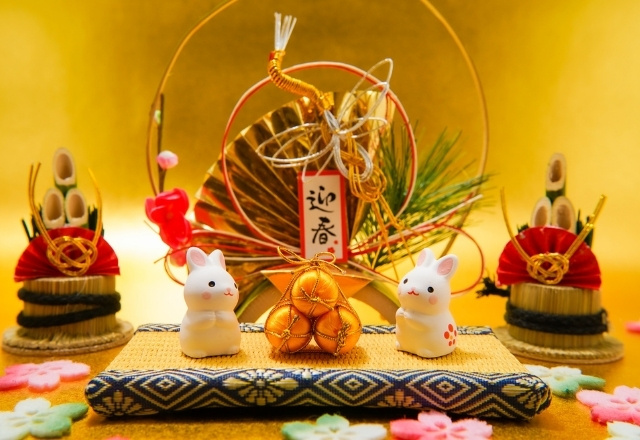If you’re planning a trip to Japan, you might be wondering how to navigate the country’s culture and customs. One of the most important aspects of Japanese life is the convenience store, or “konbini” in Japanese.
Japanese convenience store, or konbini (コンビニ), is more than just your go-to stop to buy snacks and a couple of Strong Zero beers. From paying your utilities (gas, electricity and water) and getting a quick coffee to getting concert tickets and sending your parcels, they can help make your trip smoother and more enjoyable.
In this guide, we’ll explore the many ways you can use Japanese convenience stores to your advantage, whether you’re in Tokyo or a smaller town. From finding affordable meals to accessing Wi-Fi and charging stations, these stores have everything you need to make your travels in Japan a success. So grab your yen and let’s get started on this journey through the world of Japanese convenience stores!
Want to live and study in Japan? Use Coto School Finder’s free support and let us assist you in finding the perfect school! Contact us today.
What are Japanese convenience stores?
Japanese convenience stores, or “konbini” in Japanese, are small retail stores that are open 24 hours a day, 7 days a week. They are a ubiquitous part of Japanese life, with over 50,000 stores throughout the country. These stores are known for their convenience, with a wide variety of products and services available at all hours of the day and night. From snacks and drinks to toiletries and household items, you can find just about anything you need at a Japanese convenience store.
The convenience of Japanese convenience stores
One of the biggest advantages of Japanese convenience stores is their convenience. You can find them on almost every street corner, and they are open 24 hours a day, 7 days a week. This makes them a great resource for travelers who need to buy supplies or food outside of regular business hours. Additionally, Japanese convenience stores are known for their high level of service. Many stores offer a variety of services, including ATMs, photocopying, printing, ticket sales, and more. This makes them a one-stop shop for many of your needs while traveling in Japan.
Best convenience stores to visit in Japan
In 2020, there are over 55,000 convenience stores in Japan, dominated by three major convenience store chains: Seven-Eleven, Family Mart and Lawson. Other chains include MiniStop, Circle K Sunkus and Daily Yamazaki, which you can find in residential areas and train stations. Most konbini stores are within walking distance. What’s better is that they’re open 24/7, which means you can remove late-night runs from your concern.

While there are many convenience store chains in Japan, here are a few of the most popular ones to visit:
1. 7-Eleven
Seven-Eleven covers almost 30% of the total convenience stores in Japan, having over 21,000 locations across the country. When it comes to konbini coffee, Seven Eleven’s remains unbeatable. Their coffee, the classic iced cuppa and cafe latte, has a more nutty and smooth flavor — nothing like watered-down bean water you’d probably expect. 7-Eleven also has ATM machines for international cards, so you can cash out your overseas debit easily (although there’s usually a handling fee).
7-Eleven also boasts their Seven Premium line, which is a range of high-quality food ranging from bread and desserts to side dishes. Side dishes range from fish, chicken, pork, and beef, as well as vegetarian options.
2. FamilyMart
Live in Japan as an international student long enough, and you’ll understand the cult following Family Mart’s fried chicken has. Better known as famichiki (ファミチキ), it’s juicy and tender, and good as something additional for your meal or snack.
Many people of FamilyMart as a well-balanced konbini. It serves delicious and ready-made onigiri and bento. Their prices, although not that far off, are relatively cheaper than Seven-Eleven too.
3. Lawson
Lawson is unique in its own way as well. Different from the two above, Lawson further made a continuation of their original konbini: Natural Lawson and 100 yen Lawson. Natural Lawson is popular for selling products that are healthy for your body. Many women enjoy shopping there, to care for their health. The 100 yen Lawson is well known for selling everything in the store, for a 100 yen, excluding tax.
How Japanese convenience stores can help you survive in Japan
Japanese convenience stores can be a great resource for travelers in Japan. Here are just a few of the ways they can help you:
Finding affordable meals:
If you’re on a budget, Japanese convenience stores are a great place to find affordable meals. You can find prepackaged meals and snacks for a fraction of the cost of a sit-down restaurant. Many stores also have a hot food section where you can buy freshly prepared meals.
Accessing Wi-Fi and charging stations:
If you need to charge your phone or laptop while on the go, Japanese convenience stores offer free Wi-Fi and charging stations. This can be a lifesaver if you’re lost and need to look up directions or if you need to check your email.
Buying tickets:
Many Japanese convenience stores offer ticket sales for a variety of events, including concerts, sports games, and cultural events. This can be a great way to save time and avoid long lines at the venue.
Sending packages:
If you need to send a package while in Japan, many Japanese convenience stores offer shipping services. This can be a convenient way to send souvenirs or gifts back home.
Role of Japanese Convenience Stores in Japan
Japanese convenience stores play an important role in Japanese society. They are a convenient place to buy supplies and food, but they also reflect Japanese culture. Many stores offer a variety of Japanese snacks and drinks, as well as seasonal items that reflect the time of year. Additionally, Japanese convenience stores are known for their high level of service. Many stores have a seating area where you can enjoy your meal or drink, and the staff is usually very helpful and friendly.

Common Japanese Phrases You’ll Hear at Convenience Stores in Japan
These will be the phrases you hear from the konbini staff when you make regular purchases, like buying onigiri, coffee or bread. We’ll get through more scenario-specific interactions below.
You might also want to learn these phrases because you are planning to work part-time in Japan as a convenience store clerk. Although engaging in customer service is seen as a big challenge by foreign students, most of the phrases are said repetitively. With practice and experience, you’re probably going to start acing the Japanese business lingo.
1. Irasshaimase (いらっしゃいませ): Welcome!
This will be the first thing you hear from the konbini staff in Japan. Meaning “Welcome”, the same phrase might be echoed by all the workers there. The standard greeting isn’t just said in a Japanese convenience store, though. Visit a cafe, ramen stand or any shop in Japan, and you’ll hear a line of crews and customer service shouting the same thing.
You don’t really need to say anything when a Japanese worker says this, as it’s just a form of hospitality. The word irasshaimase comes from いらっしゃる, which is the Japanese polite form of iru (いる), which means “to be”.
2. Shoushou omachi kudasai (少々お待ちください): Please wait a moment
The Japanese phrase means “Please wait a moment” in its most humble form. Say you want to order a famichiki from the display. The konbini staff will have to pick it up in person, leaving you waiting for a minute. Before this, they will usually say “少々お待ちください”.
The word shoushou (少々) means “a little while”, while the word お待ちください is stemmed from the Japanese verb matsu (待つ), which means “to wait”.
3. Omatase itashimashita (お待たせいたしました): Thank you for waiting
This is usually said after you say “Shoushou omachi kudasai”, the phrase translates to “Thank you for waiting”. It’s used by the staff when they’ve returned to the register. You’ll also hear it when you’re waiting in line and finally getting to the cashier.
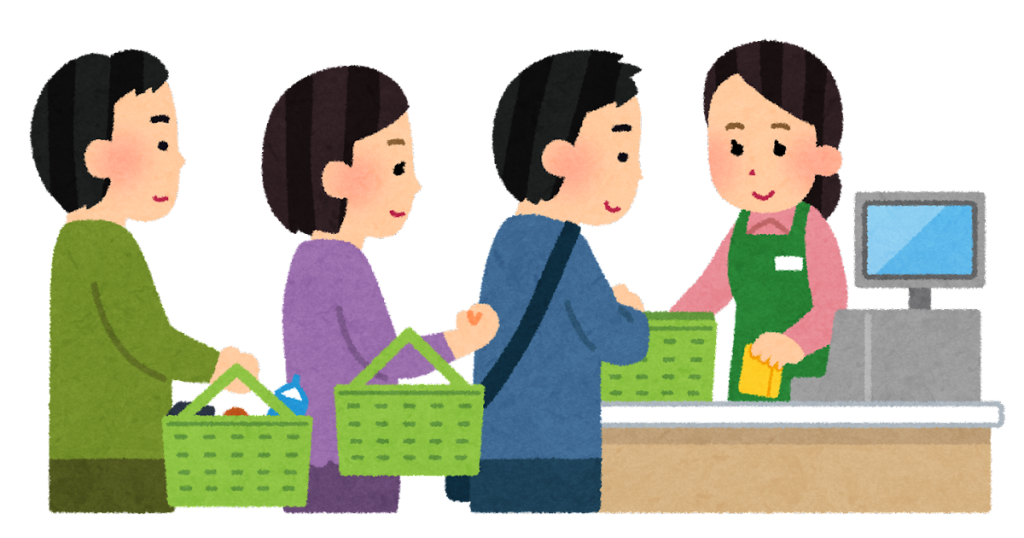
3. Otsugi no kata douzo (お次の方どうぞ): The next person, please!
The word 次 means “next”, while kata (方) means “person”. The word douzo (どうぞ) is the kind you’d hear in a lot of casual and business settings in Japan, which means “please go ahead”. Together, お次の方どう means “The next person in line, please.”
You will usually hear the cashier saying this while raising their arm to gesture that they may move in line.
There are other variations to this phrase. We’ll list them below so you don’t get surprised and confused when you hear them.
| Japanese | Romaji | English |
|---|---|---|
| お次でお待ちの方どうぞ | Otsugi de omachi no kata douzo | The next waiting person, please |
| お次でお待ちのお客様どうぞ | Otsugi de omachi no okyakusama douzo | The next waiting (customer), please |
| お次のお客様どうぞ | Otsugi no okyakusama douzo | Next customer, please |
4. Pointo kaado ha omochi desuka (ポイントカードはお持ちですか): Do you have a point card?
Your first introduction to the Japanese love for point cards starts with this question: “Do you have a point card?”
A point card is a loyalty program, where you can receive one point (which equals one JPY) for every 100 (or 200) JPY you spent at the store. It’s usually free, and you can have a digital version of it. If you like to go to the same konbini regularly, we recommend getting one so you can pile up points for future purchases.
5. Botan o oshite kudasai (ボタンを押してください): Please press the button
The legal age in Japan to drink and smoke is 20 years old, but anyone can pick up a pack of beer or ask for a cigarette at a convenience store. They will usually require you to confirm your age through the touch screen monitor. After they scan the product, you’ll hear the staff say, “Botan o oshite kudasai”, which means, “Please press the button” — referring to the screen.
Besides that, you may also hear:
| Japanese | Romaji | English |
|---|---|---|
| 画面のタッチお願いします | Gamen no tacchi onegai shimasu | Please touch the screen. |
| 年齢確認ボタンを押してください | Nenrei kakunin botan o oshite kudasai | Please press the age confirmation button. |
| 年齢確認お願いします | Nenrei kakunin onegaishimasu | The age confirmation, please. |
6. Obentou atatamemasuka (お弁当温めます): Do you want to heat the bento?
This Japanese question is not just exclusive to your bento boxes, too. Things like soups, bread and even onigiri can be heated, and the process usually takes a few seconds (for small meals) to a minute (for bigger bento). You can usually wait directly in front of the register, scooching to the side a bit to allow other customers to pay for their items.
If you’re planning to heat your meal at home, you can refuse by saying:
いいえ、大丈夫です.”
Iie, daijoubu desu.
No, it’s fine.
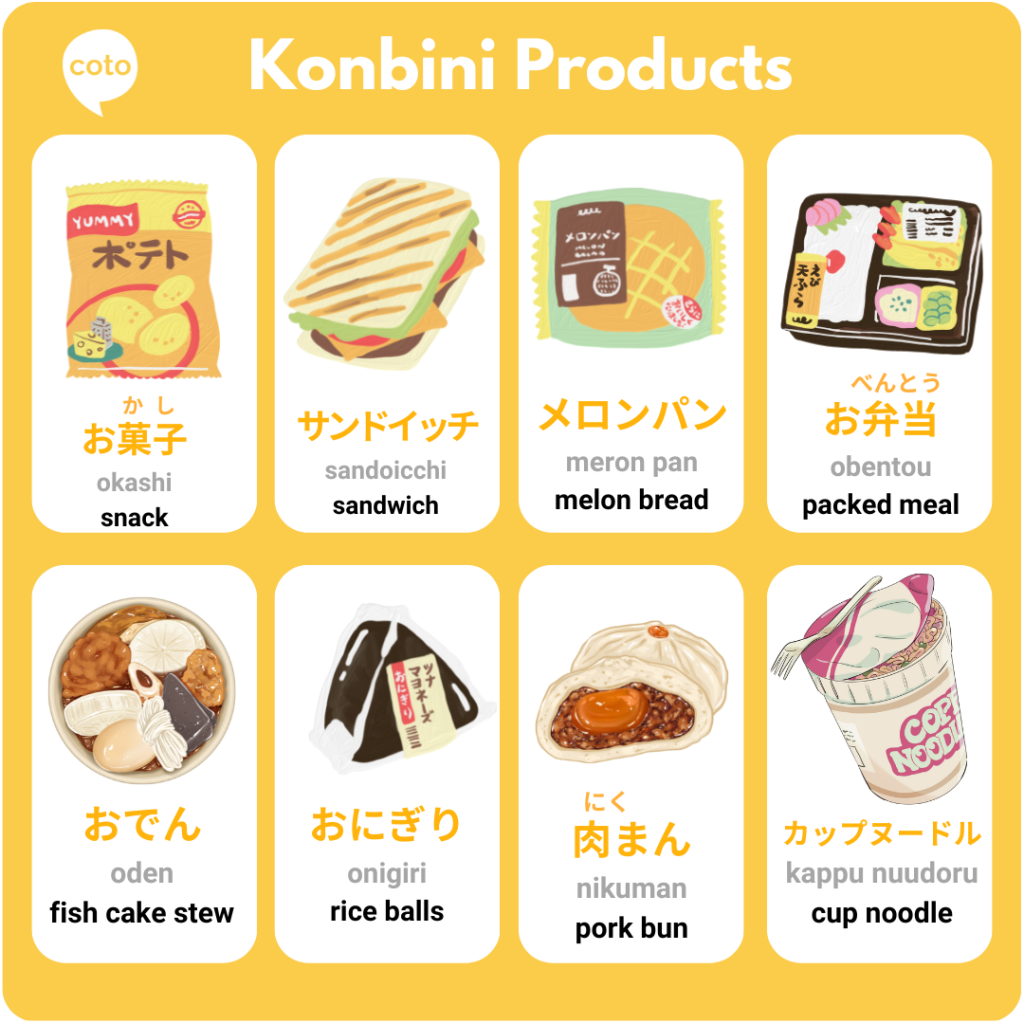
7. 〇〇 wa otsukai ni narimasu ka (〇〇はお使いになりますか): Would you like to use 〇〇?
Rice, noodle, pasta, salad or soup. Now that you’ve selected your meal, it’s time to choose the utensils you want to use. Typically, a konbini provides options for a fork, spoon, chopsticks or a spork.
While Japanese people prefer to use chopsticks, this is part of the customary questions the staff will ask, regardless of your nationality.
When they ask you this phrase, they would either say one of these options:
| Japanese | Romaji | English |
|---|---|---|
| スプーン | Supuun | Spoon |
| フォーク | Fooku | Fork |
| お箸 | Ohashi | Chopstick |
| ストロー | Sutoroo | Straw |
Some konbini staff may also just ask:
お箸をお付けしますか?
Ohashi wo otsukeshimasuka?
Would you like to use a chopstick?
8. Fukuro ha goriyou desuka (袋はご利用ですか)?
As of July 2020, stores, including the convenience store chains, in Japan must sell their plastic bag. Places like Family Mart and Seven-Eleven usually offers plastic bag for 3 JPY, regardless of their size or type (bento or normal white plastic bag).
Even if you’re buying a can of soda or small candies, the store clerk might still ask if you need a bag by saying the phrase, “Fukuro ha goriyoyu desuka?” which means: “Do you use (need) a plastic bag?”
To clarify that you need an additional fee for the plastic bag, they might say yuuryou no fukuro (有料の袋).
有料の袋はご利用ですか?
Yuuryou no fukuro ha goriyou desu ka?
Will you need a (paid) plastic bag?
レジ袋3円ですが、ご利用になりますか?
Reji bukuro saneen nan desuga, goriyou ni narimasuka?
The plastic bag is 3 JPY, but will you need it?
You can respond it two ways:
はい、お願いします。
Hai, onegaishimasu.
Yes, please.
大丈夫です。
Daijoubu desu.
It’s okay.
9. Fukuro ni oirehimasu ka (袋にお入れしますか): Shall I put it in the bag?
It might sound similar to the previous question, but because Japan is trying to encourage the people to bring their own eco bag, the konbini staff will usually ask this when they see that you brought your own bag. They might offer to help you put your purchases inside the bag.
10. Fukuro o owakeshimasuka (袋はお分けしますか)?
The word owakeshimasuka (お分けしますか) is the polite form of 分ける, which means “to separate”.
Say you’re doing a huge haul at your local konbini store in Japan. You’re buying bento boxes, ice cream, hygiene products and a few cleaning supplies. There’s hot and cold food, along with household items. You may want to put them in separate bags out of personal preference. When the staff asks you, “Would you like these items bagged separately?” you can say simply accept or refuse.
If you’re fine with having your items inside one plastic bag, say this:
一緒で大丈夫です。
Issho de daijoubu desu.
Together is fine.

12. Gokaikei wa 〇〇 en degozaimasu (ご解系は〇〇円でございます): The total is 〇〇 yen
The Japanese word kaikei (会計) means “bill”. Degozaimasu (でございます) is the humble form of desu (です). When all your items are scanned, the employee will announce the total amount that you need to pay.
You don’t have to reply anything in particular, but this is the time for you to prepare your cash or any method of payment
13. Reshiito wa yoroshii desuka? (レシートは宜しいですか): Do you want the receipt?
A lot of customers in Japan like to throw away the receipt immediately. You’ll find a small, open box in the register table dedicated to throwing out receipts. You can throw them away yourself, but the staff might take initiative to ask, “Are you fine (without) the receipt?” so they can throw it themselves.
14. 〇〇 en o asukari itashimasu (〇〇円を預かり致します)
The verb azukaru (預かる) has a unique meaning: to be entrusted, to take care of and to be in charge. In this case, when you’ve given the clerk cash for your purchases, they will receive it while saying this phrase, which more or less means, “You have entrusted me with (this amount of) money.”
They do this for two purposes: to show politeness as part of the customer service etiquette, and to confirm the amount.
Alternatively, they can also say:
〇〇円からでよろしいですか?
〇〇en kara de yoroshii desu ka?
You’re paying with 〇〇 yen, is it correct?
15. 〇〇 en no kaeshi to reshiito degozaimasu (〇〇円の返しとレシートでございます): Here is the change and receipt.
Finally, the last step. Meaning, “This is your (amount) change and receipt,” it is just as a confirmation for the staff as it is for you. You don’t need to say anything back, although a simple arigatou gozaimashita (ありがとうございました) and domo (ども) won’t hurt.
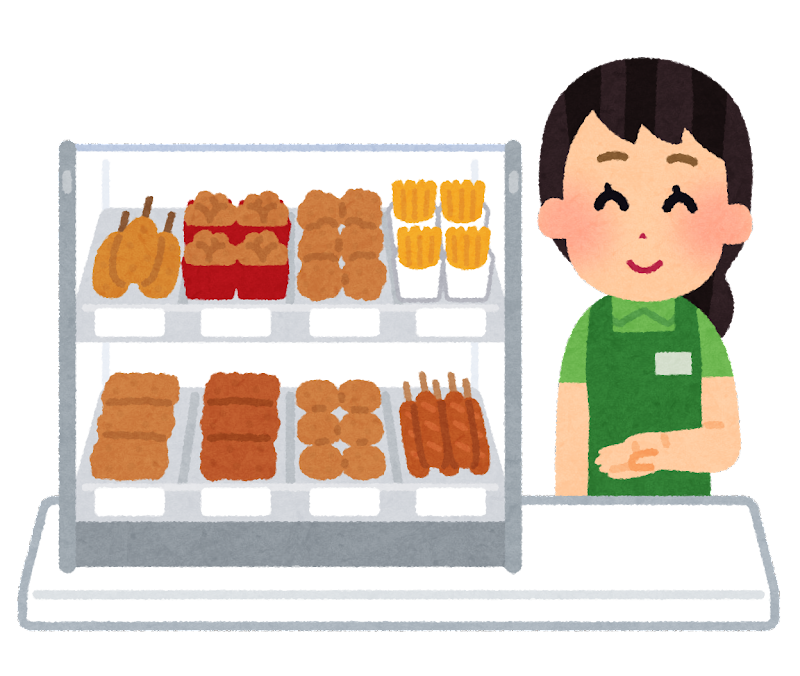
How to Order Deli Food at a convenience store in Japan
Particularly when the weather gets colder, you’ll spot nikuman (肉まん) and oden (おでん) sitting next to the cashier. If you’re craving hearty, warm food, you can order them by mentioning the food to the store staff.
For this, you can say:
すみません!肉まん1つください。
Sumimasen! Nikuman hitotsu kudasai.
Excuse me! Could I please have one pork bun?
The store staff will usually say something like:
かしこまりました。少々お待ち下さい
Kashikomarimashita. Shoushou omachi kudasai
Of course. Please wait for a moment.
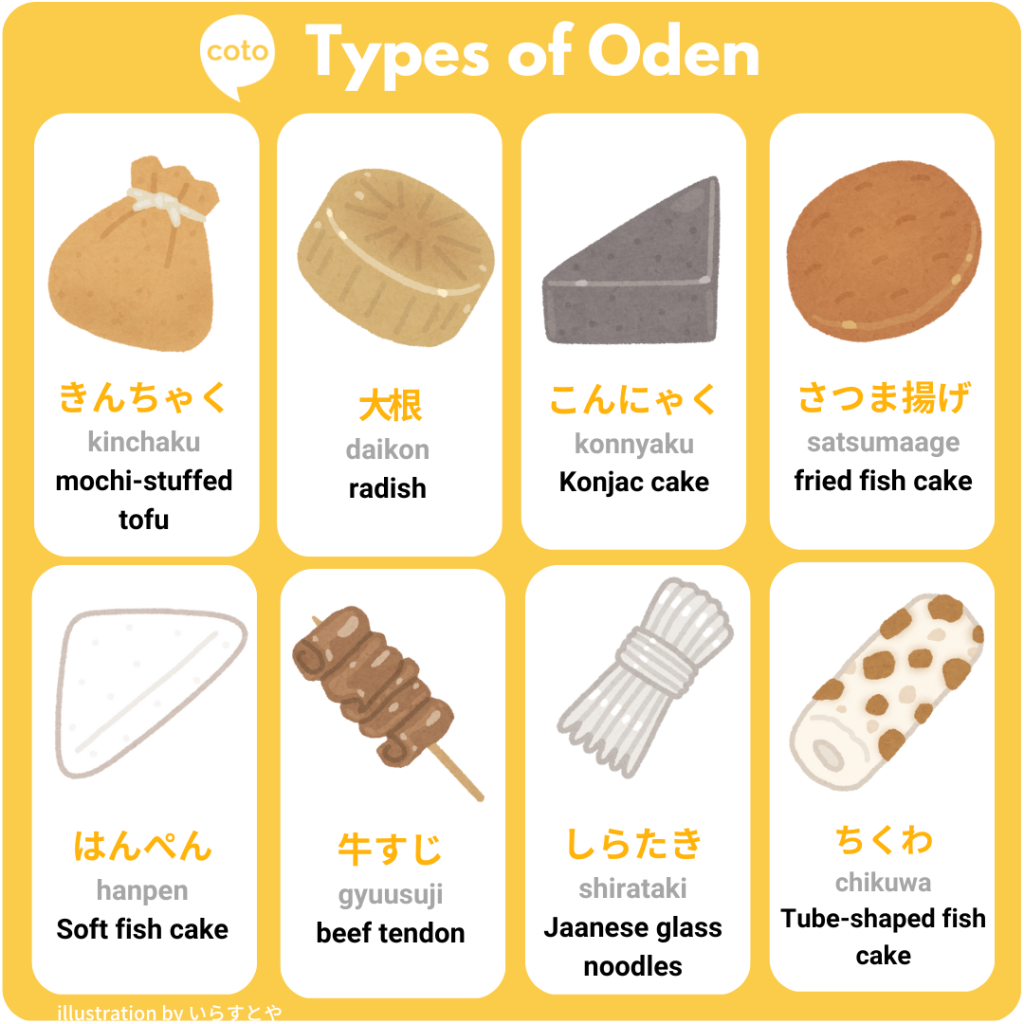
For oden, which is a type nabemono (Japanese one-pot dishes), you can say the same thing:
すみません!おでんを選びたいです。
Smimasen! oden wo erabitai desu.
Excuse me, I would like pick oden
To pick which type of oden you want, you can simply point them out.
大根1つ。卵1つ。はんぺんを2つ。こんにゃく1つ。
Daikon hitotsu, tamago hitotsu. Hanpen wo futatsu. Konnyaku hitotsu.
I would like radish, egg, 2 hanpen, and konjac.
Sending a Package from a Japanese Convenience Store
Japanese convenience stores are really one of the most convenient places. You can send parcels across Japan with their takyuubin service. You can send golf clubs, luggage, music instruments and other heavy-duty items nationwide.
Now, there are many stores that allow you to send and receive packages. Here is a useful phrase you can use:
荷物を送りたいです。
Nimotsu wo okuritaidesu.
I would like to send a package.
元払いですか?着払いですか?
Moto barai desuka? Chakubarai desuka?
Would you like to make a pre-payment or payment after arrival?
元払いでお願いします。
Motobarai de onegaishimasu.
Pre-payment please.
こちらの紙にご記入お願いします。
Kochira no kami ni gokinyu onegaishimasu.
Please fill out the form here.
Eating in convenience stores in japan
Another thing to take note of is that ever since October of 2019, Japan has raised its taxes to 10% and additionally introduced an eat-in tax. If you decide to eat in a store, the stores will charge you with 10% tax, as opposed to an 8% tax for take-out. This is also applicable for convenience stores as they have a small eat-in space for customers. It is very important to tell the store staff that you will be eating in.
店内で食べます。
Tennai de tabemasu.
I will be eating in.
A simple phrase like the above lets the staff know to charge the correct tax for you.
Conclusion
Japanese convenience stores are an important part of Japanese culture and a valuable resource for travelers. With their wide range of products and services, from food and drink to ticket sales and shipping services, they can help make your travels in Japan a success. So next time you’re in Japan, make sure to stop by a konbini and experience the convenience for yourself!
Do you want to study and live in Japan?
With so many things to explore, are you considering living in Japan — perhaps to go to university or work? Enrolling at a Japanese language school might be the perfect option for you, as it will prepare you to get to your next goal.
If you are ready, let Coto School Finder assist you in finding the right program in the city of your choice and applying for a student visa — for free! Contact us by filling out the inquiry form below!
FAQ
What is a Japanese convenience store?
A Japanese convenience store, also known as “konbini” in Japanese, is a small retail store that provides a wide range of products and services to customers. These stores are known for their convenience, extended operating hours, and diverse offerings.
What products can I find in a Japanese convenience store?
Japanese convenience stores offer a vast array of products, including snacks, beverages, pre-packaged meals, fresh food items, toiletries, household essentials, stationery, magazines, and more. Additionally, some stores have ATMs, photocopying services, ticket sales for events, and even delivery services.
What are some popular snacks and drinks available in Japanese convenience stores?
Japanese convenience stores are renowned for their unique and delicious snacks and beverages. Some popular snacks include onigiri (rice balls), bento boxes, sandwiches, cup noodles, potato chips with various flavors, and an assortment of candies and chocolates. As for drinks, you can find a wide range of options such as green tea, soft drinks, fruit juices, coffee, and even alcoholic beverages.
Are Japanese convenience stores open 24 hours?
Yes, many Japanese convenience stores operate 24 hours a day, 7 days a week. This is one of the defining characteristics of konbini, as they provide round-the-clock service to cater to customers’ needs at any time.
Can I buy tickets for transportation or events at a Japanese convenience store?
Yes, Japanese convenience stores often serve as ticketing outlets for transportation (such as train tickets, bus passes) and various events, including concerts, sports games, and local attractions.
Do Japanese convenience stores offer delivery services?
Yes, many Japanese convenience stores offer delivery services for various items. You can have products delivered to your home, workplace, or even to a specific convenience store for pick-up. This service is particularly popular for online shopping and food deliveries.




